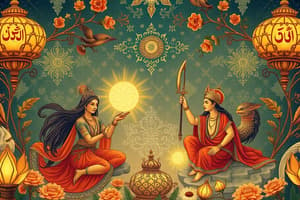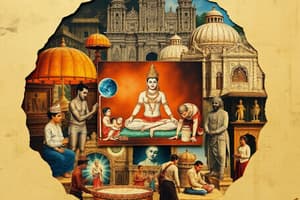Podcast
Questions and Answers
What is the hearth of Hinduism?
What is the hearth of Hinduism?
Indus River Valley
Where did Hinduism diffuse?
Where did Hinduism diffuse?
South Asia and Southeast Asia
Who is considered the founder of Hinduism?
Who is considered the founder of Hinduism?
Unknown
What is a significant sacred site in Hinduism?
What is a significant sacred site in Hinduism?
What is the place of worship in Hinduism?
What is the place of worship in Hinduism?
Which of the following are key beliefs/traditions in Hinduism? (Select all that apply)
Which of the following are key beliefs/traditions in Hinduism? (Select all that apply)
What is a characteristic of Buddhism's hearth?
What is a characteristic of Buddhism's hearth?
Who is the founder of Buddhism?
Who is the founder of Buddhism?
What is a significant sacred site in Buddhism?
What is a significant sacred site in Buddhism?
Which of the following represents key beliefs/traditions in Buddhism? (Select all that apply)
Which of the following represents key beliefs/traditions in Buddhism? (Select all that apply)
What region is considered the hearth of Sikhism?
What region is considered the hearth of Sikhism?
Who is the founder of Sikhism?
Who is the founder of Sikhism?
What are the Five Ks in Sikhism? (Select all that apply)
What are the Five Ks in Sikhism? (Select all that apply)
What sacred text is associated with Islam?
What sacred text is associated with Islam?
What is the place of worship in Islam?
What is the place of worship in Islam?
Who is the founder of Islam?
Who is the founder of Islam?
What symbol is commonly associated with Islam?
What symbol is commonly associated with Islam?
What are key beliefs and traditions in Islam? (Select all that apply)
What are key beliefs and traditions in Islam? (Select all that apply)
What is Judaism's place of worship?
What is Judaism's place of worship?
What is Judaism's holy book?
What is Judaism's holy book?
Flashcards are hidden until you start studying
Study Notes
Hinduism
- Originated over 4000 years ago in the Indus River Valley.
- Diffused throughout South Asia and into Southeast Asia, primarily through relocation diffusion today.
- Lacks a known founder; influenced by the migration of Indo-Aryans around 1500 B.C.
- Ganges River is a sacred site; millions pilgrimage annually, with bathing believed to cause remission of sins.
- Worship occurs in temples; household shrines are also common.
- Key beliefs include reincarnation, karma, and a general avoidance of beef.
- The caste system categorizes social classes based on perceived differences and roles, still influencing modern society despite being outlawed.
- Cultural landscape features include household shrines and statues, notably of Shiva.
Buddhism
- Emerged from Hinduism around 2500 years ago, originating in Nepal and the Ganges River area.
- Diffused into Tibet and East Asia, spreading through missionaries and trade; primarily relocation diffusion today.
- Founded by Siddartha Gautama (the Buddha), who renounced princely life for spiritual enlightenment.
- Sacred sites include stupas, which serve as burial places or storage for religious objects.
- Key teachings revolve around the "four Noble Truths" and the "8-Fold Path" focused on attaining Nirvana.
- Cultural symbols include the Dharma Wheel, representing the noble eightfold path.
- Places of worship are pagodas or temples.
Sikhism
- Originated in Northern India and Northeastern Pakistan.
- Guru Nanak, the founder, spread Sikhism through major journeys in the late 17th century.
- Key beliefs incorporate tenets from both Islam and Hinduism, emphasizing kindness and the existence of one God.
- The Five Ks are articles of faith mandated by Guru Gobind Singh for Khalsa Sikhs.
- Cultural landscape features Gurdwaras, where the holy book, Guru Granth Sahib, is kept.
- The Khanda, a military emblem, symbolizes Sikh identity.
Confucianism
- Established in China about 2500 years ago, gaining popularity posthumously through Confucius' teachings.
- Spread through East and Southeast Asia but faced suppression under Communist regimes.
- Emphasizes the importance of present life, respect for elders, and a patriarchal structure.
- Cultural landscape includes statues of Confucius and representations of his character.
Shintoism
- Originated in Japan, evolving from local religions and merging with Confucianism and Buddhism.
- Limited diffusion outside Japan, primarily following Japanese immigration.
- Worship occurs at shrines, where practitioners honor kami—supernatural entities linked to nature.
- Cultural symbols include the Torii Gate, marking the transition from the mundane to sacred spaces.
Judaism
- Originated around 4000 years ago in present-day Israel.
- Experienced significant relocation diffusion during the Diaspora, spreading into Europe and North America.
- Abraham is considered the founder, establishing a covenant with God; Jews regard him and his descendants as chosen people.
- Key beliefs include the anticipated arrival of a Messiah, dietary laws (kosher), and the movement of Zionism.
- Worship is conducted in synagogues, and the Torah serves as the holy text.
- Cultural symbols include the Star of David and the Menorah.
Christianity
- Originated in Southwest Asia about 2000 years ago, diffusing globally through colonialism.
- Places of worship are churches, with distinct architectural styles for Catholic, Eastern Orthodox, and Protestant denominations.
- Jesus Christ is recognized as the founder, with teachings recorded in the Bible.
- Key beliefs include achieving eternal life through following Jesus' teachings and a monotheistic framework.
- Symbols include the cross and the Icthys fish, symbolizing Jesus Christ.
Islam
- Emerged on the Arabian Peninsula about 1500 years ago.
- Diffused through North Africa, Spain, and Southeast Asia as a universalizing religion.
- Muhammad is recognized as the founder and messenger of Allah.
- Sacred texts consist of the Quran, with significant sites being Mecca, Medina, and Jerusalem—Mecca housing the Kaaba.
- Following Muhammad’s death, Islam split into Sunni and Shi'a branches.
- Key beliefs include the oneness of God, the prophethood of Jesus, and the practices encapsulated in the Five Pillars.
- Cultural symbols include the Star and Crescent, with restrictions on depicting Muhammad due to idolatry concerns.
Studying That Suits You
Use AI to generate personalized quizzes and flashcards to suit your learning preferences.




